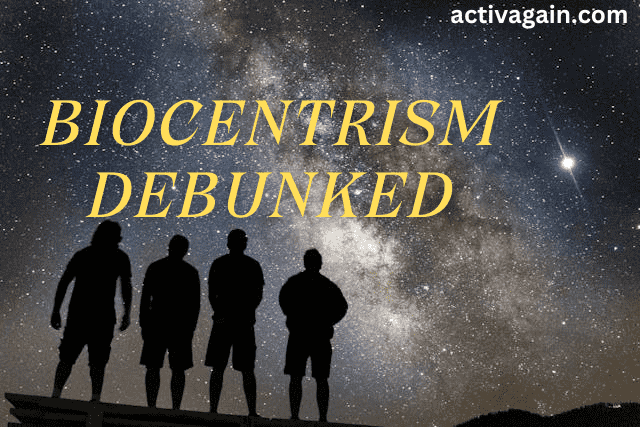
Biocentrism Debunked: Unveiling the Intricate Interplay of Philosophy and Science
In recent years, there has been a growing fascination with the concept of Biocentrism Debunked, which proposes that all life and the universe itself are intricately interconnected. This thought-provoking belief suggests that it is life that gives rise to the universe, rather than the universe being the catalyst for life. While it may hold immense appeal for many, it is essential to subject these ideas to rigorous scientific and philosophical scrutiny, as they can be subject to challenges on several fronts.
Understanding the Philosophy behind Biocentrism Debunked
At the heart of biocentrism lies the perspective that moral responsibility extends beyond human beings to encompass the entire natural world. Coined in the 1970s by esteemed biologist and environmentalist, Dr. Richard Sylvan, this term draws inspiration from various sources. Aldo Leopold’s land ethic, Albert Schweitzer’s reverence for life, and even Eastern philosophies that emphasize respect for all life forms have all contributed to the development of this concept.
Going Deeper: The Principle of Life Creating Reality
one of the core principles of biocentrism revolves around the notion that reality itself is a product of life’s very existence. From building upon the quantum mechanical idea of the “observer effect,” which suggests that the act of observation influences the phenomenon being observed. The biocentrism extrapolates this concept to the macroscopic universe. Thus, according to biocentrism, the universe only exists because conscious life observes it.
Dr. Robert Lanza’s Expansion of Biocentrism Debunked
Renowned scientist and stem cell researcher, Dr. Robert Lanza, took the concept of biocentrism a step further by offering a deeper interpretation of its implications in understanding our reality. His “biocentrism debunked Theory” proposes that life and consciousness are fundamental in comprehending the nature of our existence, asserting that they play an active role in creating the universe.
The Core Principles of Biocentrism Debunked
Biocentrism Debunked puts forth a set of core principles that anchor its philosophy. One such principle is the inherent value placed on all living things, irrespective of their species, complexity, or usefulness to humans. Whether it is the tiniest microbe or the largest mammal, each organism is believed to possess intrinsic worth within this framework.
Furthermore, biocentrism debunked challenges the notion of human superiority over other life forms and instead advocates for viewing humans as mere participants in the intricate web of life. This perspective encourages a more egalitarian outlook, where all forms of life are considered equal.
Embracing Interconnectedness: The Vital Network of Life
Another principle propagated by biocentrism is the idea of interconnectedness. According to this belief, all life forms are connected through a complex network of relationships that collectively maintain the balance and health of our planet. It urges us to deeply consider the implications of our actions on the broader ecological community, fostering a profound respect for both nature and its inhabitants.
Biocentrism offers a fresh perspective that encourages us to reevaluate our relationship with the natural world and our fellow living beings. By pondering the intricate links between consciousness, life, and the universe, we embark on a journey of philosophical and scientific inquiry, enriching our understanding of the profound mysteries that surround us.
Understanding Biocentrism Exploring its Origins and Core Principles:
Biocentrism, a gospel gaining instigation, posits that all life and the macrocosm are connected, challenging traditional views. Chased byDr. Richard Sylvan in the 1970s, it draws alleviation from Aldo Leopold, Albert Schweitzer, and Eastern doctrines. At its core, biocentrism proposes that conscious observation creates reality, echoing the amount mechanical bystander effect.
Renowned scientist Dr. Robert Lanza expanded on this, suggesting life and consciousness are fundamental to understanding the universe. biocentrism debunked champions the inherent value of all living things, rejecting human superiority and emphasizing interconnectedness. It promotes environmentalism by assigning intrinsic moral value to all organisms, fostering a more profound respect for nature.
biocentrism debunked and Environmental Ethics: A Philosophical Exploration
Biocentrism, an environmental ethics philosophy, extends moral responsibility to all living entities. While biocentrism focuses on individual organisms, ecocentrism emphasizes species and ecosystems. Despite theoretical differences, a convergence is possible over time, creating a universal environmental ethic. Biocentrism asserts that all life forms have intrinsic value, aligning with various ethical strands like Schweitzer’s reverence for life and Peter Singer’s animal liberation.
The philosophy’s three tenets highlight the universal drive for self-preservation, positing intrinsic value in life forms. These principles advocate equal moral rights for all living entities, promoting moral recognition, consideration, and protection.
Biocentrism’s Loopholes Scrutinizing Scientific and Philosophical Claims
While biocentrism debunked presents an charming worldview, it faces scrutiny on scientific and philosophical grounds. The claim that space and time are constructs of the mind conflicts with well- established scientific principles like Einstein’s proposition of reciprocity. Also, asserting life and knowledge as abecedarian forces lacks empirical support, unlike quantifiable forces similar as graveness.
The proposition’s reliance on the bystander effect in amount mechanics is misknew, as it does not bear a conscious bystander. The macrocosm was for billions of times before conscious life, as supported by cosmological substantiation. Neglecting the alternate law of thermodynamics and adding gratuitous complexity, biocentrism appears inconceivable in light of current scientific understanding.
Conclusion Questioning Biocentrism’s Foundations
While biocentrism debunked introduces witching generalities, it appears erected on misconstructions and unsubstantiated claims. Current scientific substantiation suggests life and knowledge are imperative parcels, challenging the notion that they produce the macrocosm. As we claw into the mystifications of life and knowledge, it’s pivotal to calculate on well- established scientific principles and question assertions that warrant empirical support.
Does biocentrism debunked offer a genuine understanding of the macrocosm, or does it introduce gratuitous complexity to our scientific worldview? The hunt for answers continues.
FAQs:
Q. What is the core concept of biocentrism debunked?
Biocentrism posits that life and consciousness are central to understanding the universe. It suggests that the physical world exists because conscious entities observe it, drawing inspiration from the quantum mechanical observer effect.
Q. Who coined the term biocentrism, and what are its philosophical roots?
Biocentrism was first coined by biologist and environmentalist Dr. Richard Sylvan in the 1970s. Its roots trace back to Aldo Leopold’s land ethic, Albert Schweitzer’s reverence for life, and various Eastern philosophies emphasizing respect for all life forms.
Q. How does biocentrism debunked promote environmentalism?
Biocentrism, as an environmental ethics philosophy, asserts that all living organisms possess intrinsic moral value. The movement advocates for the rights and worth of all living beings, prioritizing their survival and fostering a deeper respect for nature.
Q. What are the primary tenets of biocentric thought regarding the value of living entities?
Biocentric thought asserts three main tenets: all living entities resist entropy, self-preservation is a universal goal, and all life forms’ intrinsic values are fundamentally equal, despite unique survival methods.
Q. What scientific criticisms does biocentrism face?
Biocentrism faces scientific scrutiny on multiple fronts. It conflicts with well-established principles like Einstein’s theory of relativity, and its claim that life and consciousness are fundamental forces lacks empirical support. Additionally, it often overlooks the second law of thermodynamics, leading to questions about its plausibility.
Q. Has biocentrism debunked been debunked by scientific evidence?
While biocentrism debunked hasn’t been fully debunked, it faces challenges due to its reliance on misunderstood scientific principles and lack of empirical support. Current scientific understanding suggests that life and consciousness are emergent properties of the universe, not foundational forces creating reality.




